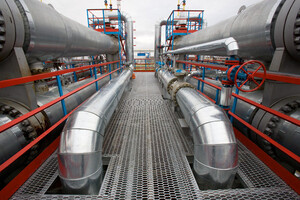The wording of the Russian monopolist surprised experts.

Russian Gazprom announced force majeure circumstances regarding several European buyers of natural gas, which could mean he intends to limit supplies, strengthening Russia's control over the region's energy. Bloomberg writes about it.
The letter of the Russian state gas monopolist dated July 14 refers to the announcement of force majeure in supplies for the last month. The end date of these insurmountable circumstances, according to the publication's sources, has not been specified.
Among the companies that received notices from Gazprom are the German utility companies Uniper SE and RWE AG.
Over the past month, Gazprom has delivered less gas than customers ordered, with the company citing problems with turbines on its main pipeline to Europe, which ends in Germany. Flows through Ukraine were also reduced as one of the two main border crossings with Russia was closed due to the war. – commented on the situation Trevor Sikorsky, head of the natural gas, coal and carbon department at Energy Aspects Ltd.
Companies usually declare force majeure when an unforeseen event, such as a fire or natural disaster, prevents them from fulfilling contracts. Retroactively launching a legal cause is “unusual to say the least,” Sikorsky said, adding that he expects European buyers to challenge the notice and seek compensation.
Exports of Russian gas to Europe via Ukraine began to decline in May, when one of the main entry points was closed to ensure security after Russian troops invaded Ukraine. Last month, supplies were even more limited, with Gazprom citing technical problems with gas turbines, one of which was in Canada after repairs and came under sanctions.
“Although Canada said that will hand over the turbine, this step of the gas monopolist may indicate that there is no chance to return the turbine before July 21, when the Nord Stream gas pipeline is supposed to be operational again,” comments Jonathan Stern, an employee of the Oxford Institute for Energy Research.
“It is also possible that the Russian government is increasing pressure on Europe and using this technical situation as an excuse not to restore flows,” Stern said.
Gazprom doesn't disclose the terms of its contracts, but most of its long-term deals in Europe typically have minimum and maximum volumes it is obligated to supply — monthly, quarterly, annually and more. European gas prices changed little on Monday.
Gazprom may have needed time to declare force majeure because it had to first cut supplies under the Kremlin's order and then try to find a way to shield the company from liability, suggests Thierry Bros, a professor at the Paris Political Institute.
The complete cessation of Russian gas supplies could potentially reduce the gross domestic product of the European Union by 1.5%, if the next winter is cold and the region does not resort to preventive measures to save energy, warned the European Commission in the project of the EU document. The impact on GDP could be 0.6% to 1% if the winter is not too cold.
Recently Gazprom saidthat it could not guarantee the proper functioning of the Nord Stream 1 gas pipeline and did not know whether the “critically important” turbine engine would be returned from repairs in Canada.
Russia later said , which cannot pick up the turbine “due to lack of documents”.
At the same time, the European Union signed an agreement on doubling the import of natural gas from Azerbaijan.
Behind the Kremlin's new gas “turbo attack” are intentions not only to resuscitate Nord Stream 2 with an artificial crisis situation, but also to introduce additional turbulence into a weak-minded Europe, which is already tired of “foreign war”, to finally “orbanize” Macron and quarrel Scholz and Habek Burbok, how will the government crisis in Germany be facilitated by preventing the adoption of a decision in the EU on the seventh package of sanctions with a gas embargo. And not only. Read more in the article by Mykhailo Honchar and Denys Vinsky “Gazprom's TurboAttack: How it Threatens Europe and Ukraine”.




